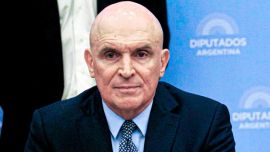The Senate granted approved to President Alberto Fernández's sweeping emergency economic package in the early hours of Saturday morning, which the new leader hopes will drag Argentina out of crisis.
It is the Frente de Todos leader's first legislative victory since he assumed office on December 10 after defeating Mauricio Macri in the presidential election. The approval was also anticipated, given Peronism's majority in the upper chamber.
The sweeping legislative package will include imposing tax increases on sectors of the upper and middle classes, as well as providing tax incentives for production and tax benefits to the most impoverished sectors of society.
It passed with the help of allies early Saturday by 41 votes in favour, 23 against and one abstention after a 12 hours of debate in the upper house.The package declares a public emergency through December 31, 2020, and gives the government powers meant to cope with it. It also allows the government greater latitude to adjust pensions.
The new law imposes a 30 percent tax on foreign currency purchases and payments and withdrawals made abroad either in cash or by credit card, while maintaining the currency cap of US$200 per person per month put in place by the Macri administration.
It also urgently seeks financing to subsidise a plan to provide free food cards for more than two million people and with the worst economic and social indicators since the 2001 economic crisis.
The administration said 70% of the new revenue will be used for social programmes and the rest for infrastructure and housing.
Cristina Fernández de Kirchner, who led the nation as head of state between 2007 and 2015 and now oversees the Senate in her capacity as vice-president, led the debate.
She started things off colourfully enough, ridiculing the leader of the Frente de Todos caucus, Jose Mayans, for addressing her as “presidente” and not “presidenta,” which the vice-president said revealed his machismo.
LOWER HOUSE APPROVAL
The package cleared the Lower House early Friday morning after a 16-hour marathon debate. Lawmakers approved it with a tally of 134 votes for and 110 against.
Despite a vocal opposition, the government managed to secure the votes needed after agreeing to concessions required by lawmakers who said they’d refrain from starting official debate until their demands were met.
Changes include lowering the export taxes on oil, gas and mining proposed in the original draft, providing tax relief for small farmers and the withdrawal of a clause that would have given the president widespread discretion to intervene in dozens of state-run organisations.
Taxes on hydrocarbon and mining exports could still reach eight percent while duties on soy exports could reach as much as 33 percent, with maize facing a 15-percent levy.
Fernández’s administration says 70 percent of the new revenue will be used for social programmes and the rest for infrastructure and housing.
The legislation will also issue a state of emergency in a number of key areas, such as the economy and healthcare, though lawmakers went on to debate it article by article.
“I have told the president of our party in the Lower House to improve the bill,” Fernández tweeted on Thursday, minutes after debate commenced.
The president said he wanted to “build trust” on the issue, though emphasised he had the votes to force through the package, if needed.
MEASURES AND TAX-HIKES
Fernández’s plan involves tax hikes on foreign currency purchases, agricultural exports and car sales.
The tax on the former – christened the “tourist dollar” – will affect purchases made on credit cards made in foreign currency, cash withdrawals overseas and payments from Argentina for services that bill in dollars, including platforms such as Spotify and Netflix.
Fernández has also retained the US$200-limit on dollar purchases put in place by the Mauricio Macri administration.
The legislative package will also hand the new president special powers to renegotiate debt terms – with Argentina seeking to restructure its debt with private bondholders and the monster US$57-billion credit-line the International Monetary Fund – and proposes a 180-day freeze on utility tariffs as part of a plan to boost spending on social welfare programmes while reining in government debt. One such programme is a plan that would see the issuing of more than two million food cards to Argentina’s most disadvantaged families.
Some proposals have proved to be unpopular in certain quarters. A few hundred supporters of former president Maurico Macri demonstrated outside Congress on Wednesday.
“Concentrating so much power in the government is the wrong path and there’s no justification for this emergency,” said Mario Negri, an opposition Juntos por el Cambio deputy.
Opposition lawmaker Luis Pastori agreed. “We recognise that in these four years the economy fell and poverty and inflation increased, with public debt with liquidity problems. But [the Mauricio Macri government] also lowered the fiscal deficit and primary public spending and lowered tax pressure. Unemployment fell a little. Are we really in emergency?”
In her typically outspoken style, Cambiemos heavyweight and outgoing national deputy Elisa Carrió, who will step down in 2020, compared Fernández to Julius Caesar, saying his quest to win “super powers” for the Executive branch was akin to the actions of a dictator.
“The rights and freedom of Argentines would remain in the hands of Alberto Fernández for six months,” she warned.
‘SOCIAL SOLIDARITY’
Government-aligned lawmakers countered that the package was necessary, with Argentina gripped by economic and social calamity.
“Six out of every 10 Argentine children live in poverty, we can’t lose any more time,” said Eduardo Bucca, a Peronist lawmaker from the ruling coalition, representing Buenos Aires Province.
“The law is called ‘Social Solidarity’ and that’s what is needed when the emergency is economic, health, financial, fiscal, debt,” declared Frente de Todos deputy Carlos Heller during a session in the Chamber of Deputies on Thursday.
Poverty is nearing 40 percent in Argentina, which is in recession and has suffered 18 months of economic crisis sparked by a currency crash. The economy is expected to shrink by 3.1 percent in 2019, inflation is hovering around 55 percent and external debt is about 90 percent of GDP.
The government hopes tax incentives will improve the situation for small- and medium-sized businesses.
Announcing the reform plan earlier in the week, Economy Minister Martín Guzmán said the measures seek to “protect sectors that are highly vulnerable.”
They include a six-month freeze on public utility prices and a 10,000-peso (US$160) bonus for low-income pensioners.
During debate in the Senate, lawmakers also brought up the idea that retired judges, diplomats and former presidents or vice presidents should be excluded from the payment adjustment freeze that will apply to many other pension-holders not considered low-income. This idea generated pushback from critics who said the idea was hypocritical given the “solidarity” of the law named as such.
Speaking prior to the debate, Cabinet Chief Santiago Cafiero called on lawmakers to pass the bill, warning that “the economy is in virtual default and 40 percent of our inhabitants are [living] below the poverty line.”
– TIMES/AFP/NA/PERFIL


























Comments